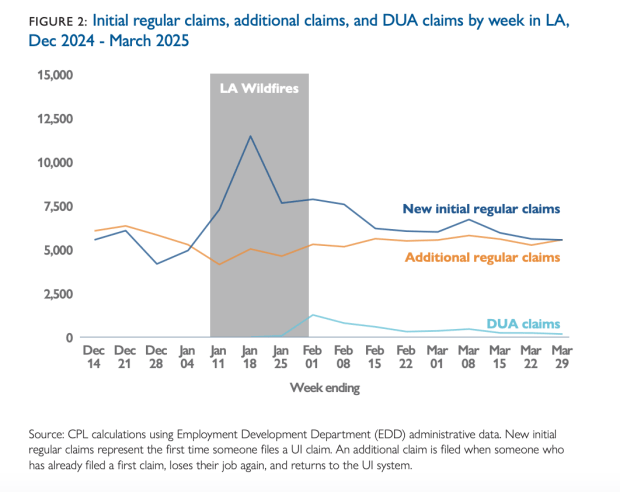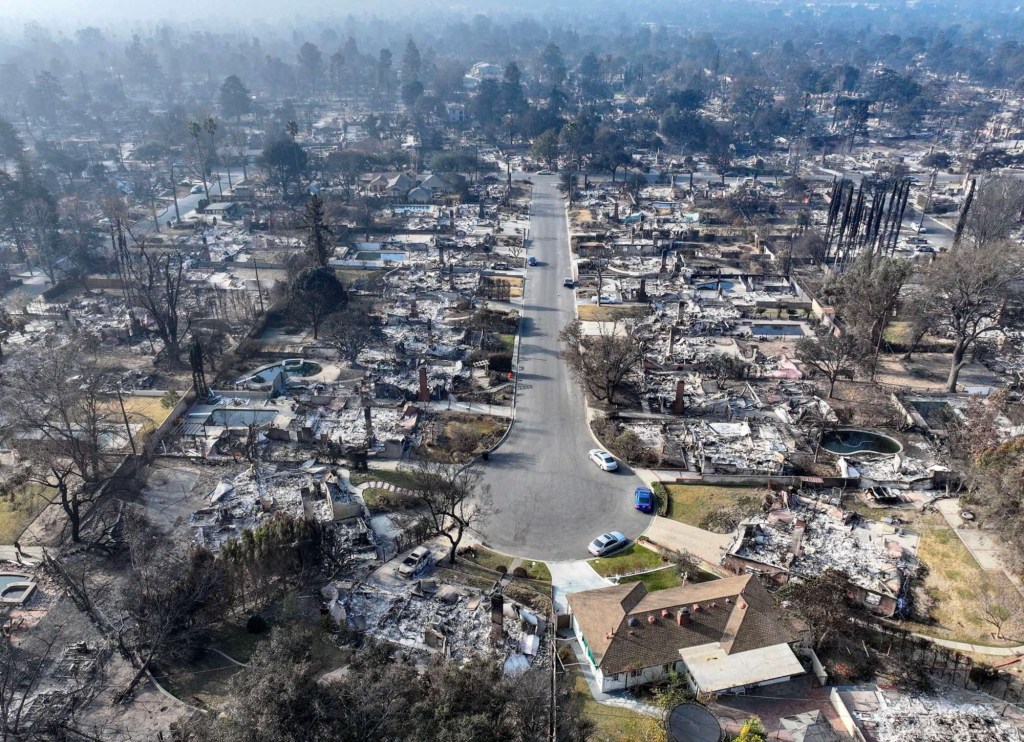Unemployment insurance claims increased by 12% to 17% in Los Angeles County after the Palisades and Eaton fires in January, according to a new report released by University of California researchers at the California Policy Lab on Monday, Aug. 25.
The fires claimed 31 lives and more than 16,000 structures were damaged, including nearly 2,000 business establishments.
The research, done in partnership with data from the California Employment Development Department (EDD), compared the increase in unemployment insurance claims to the previous year and nearby counties to determine how much these claims could be attributed to the fires.
“What the report tries to do is understand, in a bit more detail, how the effects of the fires rippled across workers in Los Angeles — understanding who these people are, where they work, what sort of jobs they held,” Peter Mannino, a senior data analyst and one of the authors of the report, said in an interview.
More than 5,200 workers filed disaster unemployment assistance claims, which expanded benefits to gig workers, independent contractors and self-employed workers who otherwise wouldn’t qualify for unemployment insurance. California’s EDD began processing these applications on Jan. 25 and the deadline ended in June.
CPL’s report found that the impact on workers extended to ZIP codes outside of areas directly affected by the Eaton and Palisades fires, with claim increases found in central and south LA.
“Seeing that most of the affected workers lived outside those communities was a surprising and interesting effect,” Mannino said. “I think the report provides kind of a nice framework on how policymakers might be able to use this data, that they also have access to, to respond to future disasters.”

Amy Yu, an attorney at the Neighborhood Legal Services of LA County (NLSLA), spoke about the spillover effects unemployment has in neighboring communities.
“A lot of people who lost their homes also affected people’s livelihoods, even though they don’t live in the area,” Yu said. “If homeowners are having trouble rebuilding, then all of these people with those non-traditional, cash-paid jobs are going to be affected because they can’t come back to their workplaces that depend on people having a home.”
NLSLA is a non-profit organization providing free legal assistance on an array of issues, including workers’ rights and appeals for any issues that may arise when applying for unemployment insurance or disaster unemployment assistance.
The report estimates that 30% to 40% of potentially impacted workers filed unemployment insurance claims. Mannino discussed how this range was estimated based on who lived or worked in or near fire-affected areas, since no information exists on the total number of those who lost their jobs due to the fires.
The 30% to 40% estimate could be a “conservative” range, especially considering how impacted workers could’ve lost required documents in the fires which “can definitely limit who has access to these important programs,” Mannino said.
Justin Adri, who is self-employed in design fabrication and landscaping, lost several files he kept in a storage container at Zorthian Ranch, a 45-acre ranch located in Altadena that was devastated by the Eaton fire. Pressed against the deadline to file for unemployment, he said it was hard to show proof of his past income due to the lack of documentation and hasn’t received any unemployment benefits.
“I’ve had no correspondence since my application, and I thought it would just take time,” Adri said. “I feel like I’m being ignored.”
Another key finding from CPL’s report highlighted uneven impacts across different industries, such as the accommodation and food services, real estate and health care and social assistance sectors. Disproportionate impacts were found for workers with an associate’s degree or some college and those with a high school diploma or less schooling.
According to the report, White workers showed a larger increase in unemployment insurance claims than other racial and ethnic groups. The report noted the difficulty in “drawing conclusions about the impact of the fires across different racial or ethnic groups,” specifically because unemployment insurance programs are not accessible to undocumented or informal workers. The report stated that this aspect could reflect differences in whether or not ethnic groups access these resources, not necessarily larger impacts on White employees.
“Access to these programs is definitely shaped by resources,” Mannino said. “And that can disadvantage a lot of communities that don’t quite have the resources to access these programs.”
Debra Sudo-Marra, a senior attorney at NLSLA, discussed the difficulties her organization had in outreaching to Asian American populations impacted by the fires for legal aid resources.
“There was a lot of fear about sharing information,” Sudo-Marra said. “And we’ve learned especially with Asian workers, even though numbers showed that there were those affected from all over — they just were not coming out.”
Sudo-Marra discussed how the topic of unemployment assistance may go under the radar in broader conversations on rebuilding after the L.A. fires.
“I think small businesses do get attention…even though we understand that those small businesses are comprised of workers, I don’t know that there’s as much light shed on [individual workers],” Sudo-Marra said. “Just as I was going through my daily life, I had to remind people of disaster unemployment assistance, EDD and benefits. Most people didn’t even know about it.”
Through the report, Mannino said that he hopes workers and business owners can understand the significant support unemployment systems can provide. For policymakers, he said they should reach out to communities where effects of the fires have spread outside of directly-affected areas.
“Reaching out to affected areas with information about the disaster unemployment assistance program, about unemployment insurance, even about any information that’s available on how to apply if documents have been lost — this sort of information would be extremely valuable to communicate to the public,” Mannino said.
Camelia Heins is a Southern California freelance writer.
